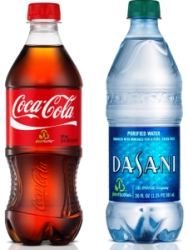
This effort to commercialize a plastic bottle made entirely from plants builds on the Company's ground-breaking introduction and roll-out of its first generation PlantBottle package, which was the first ever recyclable PET beverage bottle made partially from plants. Since introduced in 2009, the Company has already distributed more than 10 billion PlantBottle packages in 20 countries worldwide.
Agreements with Virent, Gevo and Avantium - industry leaders in developing plant-based alternatives to materials traditionally made from fossil fuels and other non-renewable resources - were signed following an in-depth two year analysis of different technologies by The Coca-Cola Company's R&D team and technical advisory board.
"While the technology to make bio-based materials in a lab has been available for years, we believe Virent, Gevo and Avantium are companies that possess technologies that have high potential for creating them on a global commercial scale within the next few years," says Rick Frazier, Vice President, Commercial Product Supply, The Coca-Cola Company. "This is a significant R&D investment in packaging innovation and is the next step toward our vision of creating all of our plastic packaging from responsibly sourced plant-based materials."
Agreements with these three companies will help The Coca-Cola Company support its long-term commitments through sustainable practices in sourcing and packaging supply. All materials will be developed in line with Company and industry recycling requirements.
"Virent's long term agreements with The Coca-Cola Company are pioneering milestones in the commercialization of our technology to produce plant-based materials" says Virent CEO Lee Edwards. "Our patented technology features catalytic chemistry to convert plant-based sugars into a full range of products identical to those made from petroleum, including bio-based paraxylene - a key component needed to deliver 100% plant-based PET packaging." PET made from Virent's bio-based paraxylene features the same high quality and recyclability as materials used today, with the added benefit of being made from a wide range of renewable materials. The company is targeting early 2015 for the opening of its first full-scale commercial plant.
"We are extremely gratified to have won the confidence of The Coca-Cola Company and are excited to support Coca-Cola's sustainable packaging goals with this agreement to develop and commercialize technology to produce paraxylene from bio-based isobutanol," says Patrick Gruber, CEO of Gevo. "New technologies need champions. The Coca-Cola Company is in a unique position to drive and influence change in the global packaging supply chain with this development. You cannot ask for a better champion than one of the most respected and admired consumer brands."
"Avantium is very proud to partner with The Coca-Cola Company to demonstrate that our patented YXY technology produces bio-based Peak expiratory flow (PEF) bottles with exceptional functional properties at a competitive price", says Tom van Aken, CEO of Avantium. "YXY is a very exciting solution for today's packaging challenges, using plant-based materials as feedstock to enable the manufacture of more sustainable packaging materials, such as PEF bottles. We have produced PEF bottles with promising barrier and thermal properties and look forward to our work with Coca-Cola to further develop and commercialize PEF bottles. Our production process fits with existing supply and manufacturing chains and we are targeting commercial production in the next few years."
The first generation PlantBottle packaging is the only fully recyclable PET bottle made with up to 30% plant-based material available today. PlantBottle packaging is made up of two components: MEG (mono-ethylene glycol), which makes up 30% of the PET, and is already made from plant materials, and PTA (purified terephthalic acid), which makes up the other 70%. In this next step, PTA will be replaced with plant-based materials, too.
It is estimated the use of PlantBottle packaging in the first two years alone has helped save the equivalent annual emissions of more than 100,000 metric tons of carbon dioxide. Coca-Cola will continue to make investments in PlantBottle technology and aims to use PlantBottle packaging for the company's entire virgin PET supply by 2020. As a leader in sustainable packaging, the company also looks for opportunities to advance smart innovation across the industry. Earlier this year, The Coca-Cola Company announced an industry-first partnership with H.J. Heinz Company that allows Heinz to produce its ketchup bottles using PlantBottle™ technology. Heinz PlantBottle™ packaging launched this summer in the U.S. (seeFood Packager of the Year: Heinz sets the table with packaging innovation )
Separately, Coca-Cola already produces a fully recyclable high density polyethylene plastic that is made 100% from plant material and is available through Odwalla™ juice brand products. While HDPE is an ideal package for some refrigerated juice products, it is not suitable for shelf-stable carbonated and still beverages.
